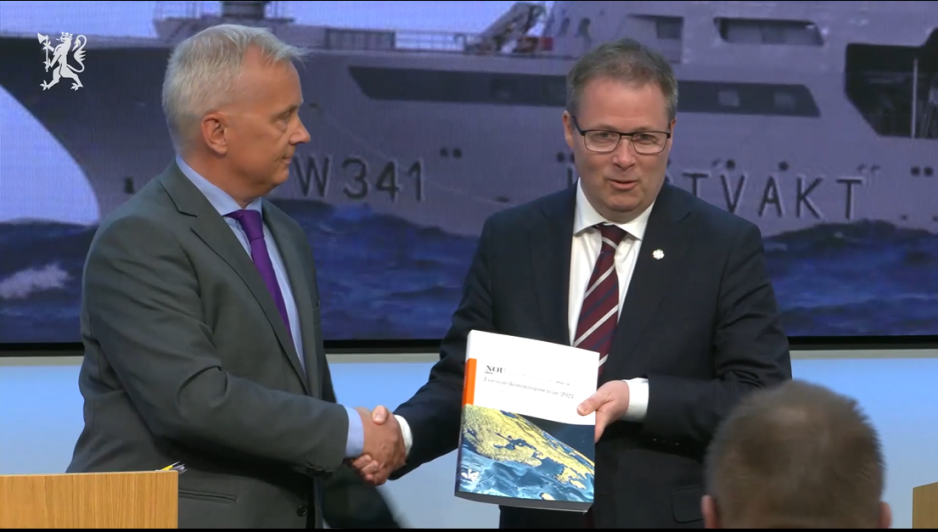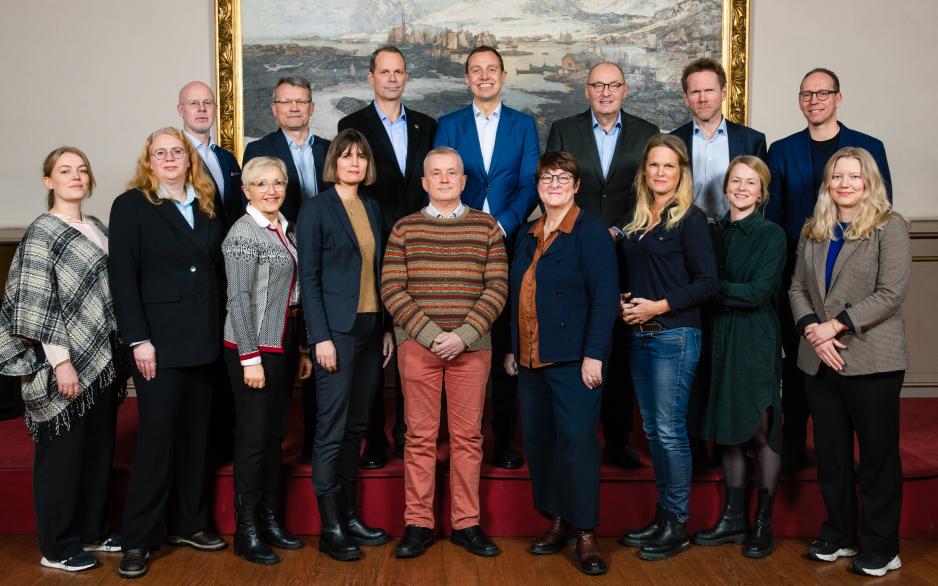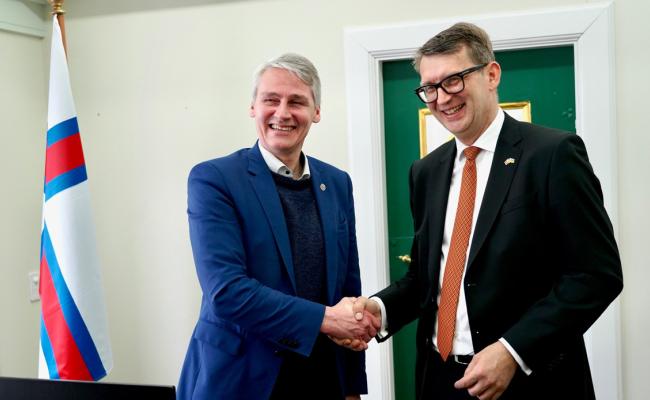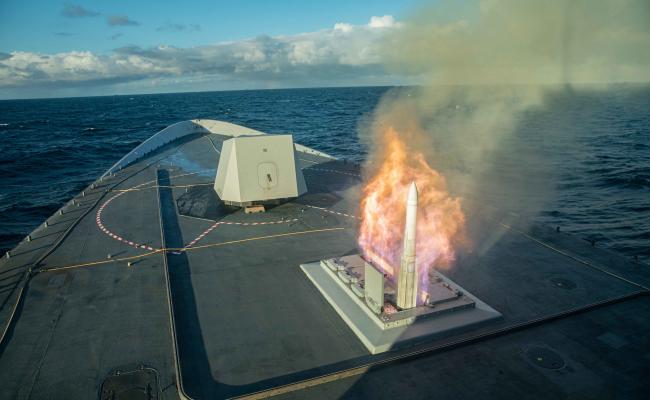The Norwegian Defense Commission: The Defense Capability Must Be Significantly Strengthened. Now!

Knut Storberget hands over the defense commission report to MoD Bjørn Arild Gram. (Screenshot from the press conference)
A united Nordic region in NATO leads to the increased strategic significance of the Kola Peninsula, believes the Norwegian Defense Commission. For the next 20 years, Norway and its allies must take into account the increasing Russian ability and willingness to threaten or use force in the north.
On Wednesday, the 3rd of May, the leader of the Expert Commission on Norwegian Security and Defence Policy, Knut Storberget, handed over the commission's recommendations for the Norwegian Armed Forces for the next 10-20 years. Read the report here (Norwegian only).
The Defense Commission's work is presented just weeks before the Chief of Defense presents his professional advice and a little over a month before the Total Preparedness Commission submits its report. The commission proposes a dramatic increase in the defense budget of a total of NOK 70 billion:
- 40 billion a year is to be spent covering the backlog for the next ten years.
- 30 billion a year is a pure increase in the budget.
This year, Norway spends 1,43% of its GDP on defense, which is NOK 32 billion away from the NATO aim of spending two percent. The defense budget for 2023 is NOK 75,8 billion.
Norway's defense must be simultanously strengthened in three areas:
1. Immediate measures for the Armed Forces' ability to cover critical vulnerabilities and deficiencies and prepare the Armed Forces for a higher and more demanding level of activity. We must make the capacities we already have work.
2. National maritime initiative which involves the entire spectrum of the Armed Forces and the defense sector in cooperation with the societal and business sector. Large parts of Norwegian and allied values, interests, and vulnerabilities, are connected to the maritime. The Armed Forces must be able to contribute to Norway taking greater responsibility for its own and its allies' security in the north at sea, in the air, and on land.
3. Comprehensive strengthening of the defense ability by developing an overall larger defense with greater depth and with a closer connection to the rest of the total defense, with a strong public and private involvement, as well as more joint solutions within a Nordic and allied framework.
Crushing criticism
"The relationship with Russia is forever changed and that has consequences for Norway. We are in the middle of a new security policy situation in which Norway's defense capability does not coincide, and even less so with regard to the constantly advancing challenges. A greater long-term perspective, predictability, and uniting political solutions are essential for investing in what is most important: Our peace and freedom," said the leader of the Defense Commission, Knut Storberget, as he handed over the commission's report to MoD Bjørn Arild Gram (Center).
The report can not be described as anything but a crushing description of the Norwegian defense capability, in which Norway is left without the ability to defend itself against the growing security threat, particularly in the High North.
"Despite a serious situation, Norway has not recognized the gravity of it. Preparing for a war when it has already arrived is costly," says Storberget.
The threat of nuclear power
The report describes a belligerent neighbor in the East which in no way poses a lesser threat after over a year of war. If anything, a weakened Russia is a larger threat than before and the commission believes that Russia will go to great lengths to rebuild what has been lost. That applies to the Northern Fleet close to the Norwegian border, among other things.
The commission also believes that, in a transitional period, there are many indications that Russia will increasingly rely on nuclear weapons as a more central part of the Russian security strategy, something that increases the strategic significance of the High North.
The Defense Commission recommends an extensive and three-part economic expansion plan:
1. The defense budget should be increased as soon as possible by NOK 30 billion over the current budget trajectory.
2. An additional NOK 40 billion should be added per year in extra allocations for a ten-year period.
3. A permanent budget increase of NOK 10 billion when the period of extra allocations is over to ensure the balance between investments and operations.
It is also to be expected that Russia will consider the NATO expansion of Sweden and Finland as an increased threat from NATO in the north. Therefore, access to the Atlantic Ocean will become even more important to Russia since the Baltic Sea will become NATO territory for all practical purposes, states the report.
The report describes the Russian Northern Fleet's ability to carry out military operations and to organize combat operations in Arctic conditions in particular, which has been significantly strengthened in recent years.
"The Russian military in the north remains a threat and directly affects Norwegian security," said Storberget during the handover.
Important, but depopulated
In such a geopolitical global situation, the significance of Norway´s Northern most region - Finnmark - also increases, and it stands out as yet another weak spot in the Norwegian defense.
The Armed Forces' facilities on the border with Russia are described as worn-out with a lack of property and buildings, as well as contributing to low well-being and delays which propagate into the structure of the Armed Forces.
"The demographic development in the north is not in our favor. We lack people," comments Storberget.
The Armed Forces is small and vulnerable, our self-reliance is too weak and our stamina too low.
The report calls for stronger political measures in order to stop the negative population development in the country's northernmost counties – which will affect both the settlement in Northern Norway and the Armed Forces' recruitment. Northern Norway will also have weaker growth than the rest of the country in the time coming and the proportion of elderly people will be greater.
The report emphasizes that the negative population development in Finnmark deserves particular attention as settlement is important for the assertion of sovereignty and could raise the threshold for military aggression.
With an increase in military activity, the commission warns against poor infrastructure in Troms and Finnmark, since the majority of resources needed to receive allied forces are chiefly located south of the Arctic Circle. There is a risk of bottlenecks arising if receiving allies in Northern Norway requires more resources than what is available in the counties.
Norwegian settlement and economic activity also have particular value on Svalbard, which does not have military bases or permanent military presence. The commission believes that increased activity in the High North may lead to an upsurge of interest in industry exploitation on Svalbard. The report also describes Svalbard as an area of military significance for Russia.
Small and vulnerable
"The Armed Forces is small and vulnerable, our self-reliance is too weak and our stamina too low," believes Knut Storberget and adds that Norway's will to prioritize security and preparedness will be the biggest challenge in the next ten years.

"This is a day we have looked forward to for a long time," said Chair of the Defense Commission, Knut Storberget, during the hand-over of the report. (Photo: the Norwegian Armed Forces)
"The defense sector is fragmented, national governance and management lack power, and we struggle fulfilling NATO's commitments. The defense ability must be strengthened now and significantly, reads the message from the Chair of the defense commission.
Storberget says that Norway must also actively contribute to NATO embracing Norwegian security needs in the north. However, the Armed Forces' restructuring makes it more demanding to fulfill the commitments to Norway's allies.
A lack of fighter aircraft and ships may lead to the Armed Forces' inability to support allies' flights or voyages in the Barents Sea. Which in turn weakens the opportunity to influence the activity in the north.
The allies' demands for Norwegian contributions are also reinforced by the Russian Northern Fleet about to gain greater strategic significance and that larger parts of the sea areas in the Arctic are being opened up to civil and military activity.
"The strengthening of Norway's defense ability must be extensive," believes Storberget.
Maritime challenges
The defense commission believes that Norway is facing a particular maritime challenge since the sea routes are crucial for ensuring supply lines to the Nordic peninsula. Something that would place further demands on Norwegian military presence in the High North.
Also read
Norway's defense ability at sea has major shortcomings and there is a need for extensive initiatives for the further strengthening of the maritime defense ability.
Norwegian authorities must also expect an increased need for a relevant intelligence service.
The defense commission believes that it is crucial that the Norwegian ability to protect national and allied intelligence needs is further developed and strengthened and there must be made investments in equipment in order to keep a close eye on Russian and Chinese strategies and the ability to operate in the Arctic and the Baltic Sea region.
Embraces the exercises
The commission emphasizes that international exercises and training missions in Northern Norway are an advantage because it strengthens the joint operative, and allied ability and contributes to a bigger allied presence with a clear message of national and allied will and ability to resist.
"We must embrace the cooperation with the USA," says Storberget.
In Northern Norway, the commission believes that there is an unredeemed potential in facilitating larger defense industrial cooperation in an Arctic environment. Particularly in light of the increased need in both East and West for maritime operations as a result of higher levels of tension internationally and increased military activity regionally.
About the Defense Commission
The Norwegian Expert Commission on Norwegian Security and Defense Policy is a public, independent commission that is set up to make assessments about the security policy situation and proposals for the aligning of the Norwegian Armed Forces' operations and organization.
The commissions are set up by the government and work under the authority and mandate of a royal decree.
Norway had five defense commissions in the 1900s: In 1908, 1920, 1946, 1974, and 1990. Before that, commissions were set up in 1836 and 1891. In December 2021, the government set up a new commission, effective from 2022. In the 2000s, there has also been appointed two defense policy committees; in 2000 and 2007.
In 1900, a coordinating management element called the Noway's Defense Commission was established. It consisted of a minister of defense, a commanding general, and a commanding admiral, and existed until 1934. Thus, this had a different character and function than the politically appointed defense commissions.
Source: SNL
However, with increased tension and with more military activity in the north, it is still important to avoid misunderstanding and unwanted escalation vis-à-vis Russia and the commission considers it to be in Norway's interest to promote stability and predictability in the north and contribute to keeping tension as low as possible in the Arctic.
Avoid escalation
Furthermore, Norwegian authorities must maintain relations with Russia in areas that are in Norwegian interest, particularly when it comes to development in the High North.
"By strengthening the Armed Forces' independent capabilities, which the commission is advocating, Norway can initiate a number of concrete measures in a Nordic framework. It is natural that the Armed Forces is designed to take on a leadership role among the Nordic defenses on the Cap of the North, in the Barents Sea, and along the Norwegian coast," reads the report.
The defense commission warns the government against what may happen if the report's recommendations are not followed. Among other things, it will contribute to ensuring that a greater proportion of the Armed Forces' tasks cannot be solved as planned or must be handled by other allied and civilian actors.
This could have particularly significant consequences in the High North and this could affect Norwegian influence in how military activity in Norway's immediate areas is carried out. It could also lead to allies acting in a way that is not in line with Norway's strategic interests or which accepts a greater risk of escalation in the immediate areas.
We have enough resources and political power to do it.
Political settlement
A serious MoD thanked Knut Storberget and the commission for their work:
"We cannot just grant ourselves freedom. The discussion about our ability to defend Norway and Norwegian interests must have other elements than just the economic. But we have the resources and the political power to do it," says Gram.
The defense commission's leader, Knut Sttorberget, concludes by saying he wants a broad political settlement in the Norwegian Storting on the strengthening of the Armed Forces and that Norway has good conditions for success.
"Such a political settlement requires a more unifying, long-term, and comprehensive approach to the defense of Norway. Norway cannot be defended alone or by military means only. Allied integration, international cooperation, and a strengthened total defense are prerequisites for a strengthened defense capability. The defense commission wants this report to inform and inspire discussion and action," concludes Storberget.
Also read
This article was originally published in Norwegian and has been translated by Birgitte Annie Molid Martinussen.



